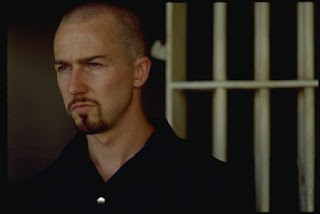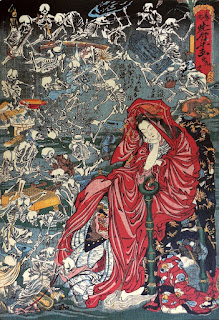Keely
I like taking a literary approach to genre works like fantasy, sci fi, and supernatural horror and seeing what comes of it.
Exploring Ideas Through Fiction
 A good book is one that makes us think--about ourselves, and about our world. Even in genre works, like sci fi, fantasy, and horror, the author still explores ideas about what it means to be human: love, hatred, trust, belief, war, disease--plus uncountable others. Even if an author doesn't intend to send a message in their work, the way that they present their characters and their setting will include certain assumptions and judgments about life.
A good book is one that makes us think--about ourselves, and about our world. Even in genre works, like sci fi, fantasy, and horror, the author still explores ideas about what it means to be human: love, hatred, trust, belief, war, disease--plus uncountable others. Even if an author doesn't intend to send a message in their work, the way that they present their characters and their setting will include certain assumptions and judgments about life.
There is no way to escape these themes, any more than writers can escape characters, plots, or words, so it is important for us to consider how we want to use them--and how they are used in authors we read. There are a number of ways to present and explore these themes in books, some more effective than others. So, in order from least to best, here are the different methods authors use to present ideas in their works:
I. Exploitation
Exploitative works present ideas in a way that thrills and titillates the audience, but which never asks difficult questions and does little or nothing to challenge societal prejudices. Such works use sex, violence, racism, religion, politics, and other hot-button issues to draw in their audience, exploiting the fact that, when we see such taboos being played out, it provokes strong emotional reactions from us.
The average Women in Prison Movie, for example, uses its setting to depict violence, nudity, lesbianism, and dominance, but it doesn't actually explore what these ideas mean. It doesn't try to define what 'justice' actually means, or look at the nature of personal freedom versus social safety. These are themes that are going to be present in any movie about incarceration, but in a low-quality exploitation film, such themes will never be explored. Of course, this doesn't mean that all movies labeled with the 'exploitation' genre must be this thoughtless--some use these techniques to get butts in seats, and can be remarkable subversive.
II. Realistic Presentation
These works present interesting themes to us in a realistic way, but never actually force us to confront them or think about them deeply. This was the criticism Roger Ebert laid against Fight Club: that the first half opens up a number of interesting questions, but the last half fails to sink its teeth into them, letting them drop away into the background. However, there are many exploitative authors who try to use this as a defense of their works--that they're only presenting the world 'as it really is'.
For example, recent authors of 'gritty' epic fantasy tend to present rape as a constant threat to women, often to the point that no female character in any of their books will fail to be threatened seriously with rape, at one point or another. They claim they are only representing 'the dark nature of war', but they never present a single male character being threatened with rape by his enemies, despite this being far from uncommon in the real world. As such, we can see that they are only presenting one side of rape, the side which our current culture finds titillating and exciting, meaning that they are writing pure exploitation, not realism.
Part of the problem with this strategy is that it acts as if the author and the work are somehow separate, allowing the author to deny responsibility for what they have written. All works of writing are artificial, because everything in a story is there only because the author chose to put it there deliberately, or because they unconsciously included it. Sitting back and saying 'no, my story is realistic, it represents the real world' is a cop-out. The book represents the author's views and mind, whether they intend it to or not, so to me it seems wiser to deliberately take advantage of this artificiality by being aware of it rather than pretending that it doesn't exist. Why choose to write a story about a prison if the theme of freedom doesn't interest you?
III. Promotion and Condemnation
This is the most simplistic way for an author to try to deal with themes in their work: to present the theme and then use various methods to try to convince the audience either that it is good, or that it is bad. Often, this means putting the idea into a certain character's mouth, such as having the hero give a long speech about the roles men and women should have in relationships. Since the hero is presented as good, and sympathetic, and competent, we are supposed to trust this speech and take the lesson to heart. Conversely, you can have the villain talk all about why Communism is the best, and since he happens to kill babies, we're supposed to conclude that Communism is evil. Sometimes, it's set up as a conversation, where the character the author wants to be right has all the proper answers, and the wrong character gets completely torn down.
Less skilled authors don't even bother to put the idea into the mouths of their characters, they just state it outright in the narration--either going off on some long tangent about their personal opinions, or perhaps slipping them in, here and there. Take for example a racist author who always uses unflattering descriptions for non-White characters, or a sexist author who describe all the good women as physically beautiful, and all the bad ones as ugly and deformed.
Though it's good that at least these authors are trying to explore ideas in their works, in the end this method is no more than propaganda, an attempt by the author to tell you what you should or shouldn't believe. It's what I've come to call 'literature of answers'--the author has some particular opinion they present as gospel truth--and any time someone tells you they have the answers, they're trying to sell you something.
IV. Negative Capability
This is the highest form of thematic exploration to which an author can aspire. Instead of simply telling the reader what to think, or presenting their own opinions in a good light and the opposite side in a bad light, the author attempts to look at an idea from several different sides, bringing up questions about how we think of that idea, of the assumptions and prejudices that go along with it, and ultimately, forcing the reader to reconsider their own position on the matter. It makes us look at the world in a new way, so that we have to confront what we thought we knew and admit that (as ever) we have more work to do. So, if the author were exploring the theme of incarceration and justice, they would have to show us not just the prisoner's side of the argument, but also the jailor's, and the judge's, and the average citizens.
Better yet, they can show us how various individual prisoners and officers see it, that some prisoners are going to disagree with others about what it means, and some prisoners and officers are going to be on the same page. What's important is that each individual view that we see comes off as valid and believable for that character, that we aren't getting weak straw men on one side and real arguments on the other. The term 'Negative Capability' was originally defined by Keats, referring to how great writers like Shakespeare wrote about ideas--that all the characters on both side of the argument seem to be strong and well-written, and as such, that it's difficult or impossible to decide which side the author personally prefers.
Indeed, a thoughtful and honest author will often admit that they don't have the answers, and that the best we can do is to present various sides of the issue, as we understand them, and to let our readers make up their own minds. This is what I've come to call 'literature of questions', where instead of giving us simple answers, the author forces the reader to consider difficult and complex questions about the nature of life and being.
What's curious is that often, when an author's message aligns with modern assumptions and prejudices, it becomes less clear whether they're writing propagandist, one-sided views. For instance, these days racists tend to be presented as evil villain characters, and you rarely get a racist character whose beliefs are presented as valid from their own point-of-view--indeed, writers who present a sympathetic racist are likely to be accused of defending racism instead of presenting various sides of the issue. Of course, the problem with this is that it supports the notion that racism is a simplistic, either/or proposition, to the point that many people think being nice means you can't be a racist--when of course, prejudice is much more subtle and insidious than that, and deserves more thorough and thoughtful treatment.
There are also some cases where an author might be providing a response to a common cultural theme that is widely taken for granted, and since it is already so familiar to readers, they don't have to present both sides--that they only need to present the revolutionary, contradictory side.
Final Thoughts
|
Kyosai - Hell Courtesan |
As authors, it's important for us to consider what themes we want to explore in our books--we don't have the space to explore all of them, so as always, it becomes a case of choosing what to leave in, and what to deliberately keep out. Certainly, it's not a problem to touch upon certain ideas, here and there, or to look at one more deeply in a certain chapter and not return to it. As readers, we must likewise try to ferret out what each author thought was important, and then try to decide what we think of the ideas they presented, and how they presented them. Were they effective? Did they bring up ideas only to exploit them, or did they present them realistically? Do they work to explore these themes, or merely depict them? Did they fill their works with a lot of drawn-out explanations and exposition, or did their themes emerge naturally from their characters and stories?
One of the most important things that you can do as an author is to choose characters, scenes, and settings that match the ideas you like to explore. If you want to explore the idea of justice, then pick characters and situations which will highlight various aspects of that idea. Give yourself every opportunity to present your themes in different ways, and from different points of view, so you can provide your reader with a more complete exploration of your ideas. For every author, there will be certain ideas that appeal to them, and to which they will return again and again over decades in various stories and books. There may also be ideas that interest you only for a while.
Getting to know what these ideas are, and why they are important to you is a vital part of finding your own authorial voice. That doesn't mean you have to be certain about them--quite the opposite: they should be ideas which puzzle you, which fill you with wonder, so that you will never tire of picking them up and looking at them again, trying to find a new angle or view that you can represent in your writing.
 1
1








